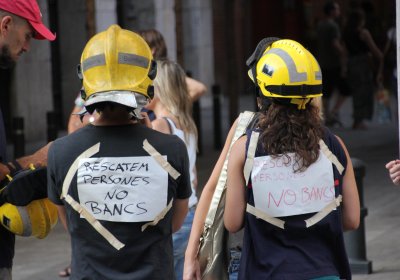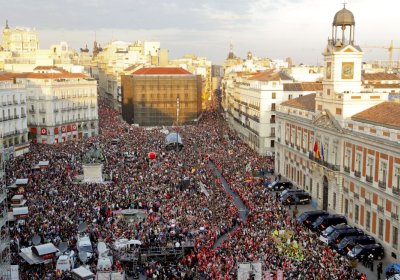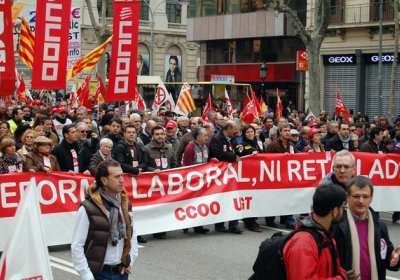Waving banners, lighting fireworks and chanting against budget cuts, millions of people in Spain were on the march in more than 80 towns on July 19.
Barcelona
Mariano Rajoy, the Popular Party Spanish prime minister of Spain, appeared at a special press conference on June 9 to give the nation the good news—Spain had won the lottery! A €100 billion prize in the European Bank Rescue Lotto!
Make no mistake, señoras y señores, this was not a “bailout package” or a “rescue” of the kind inflicted on Greece, Ireland and Portugal, full of those nasty “macroeconomic conditionalities” imposed by the “troika” of the European Union, European Central Bank and International Monetary Fund..
In the week before the first anniversary of the indignado (“the outraged”) protests and camps that broke out across Spain on May 15 last year, the Spanish media was full of opinionated wishful thinking about the state of what became known as the 15-M movement.
This wasn’t just the usual malice of the right-wing media, which can always be relied upon to play up the inevitable roughness of some indignado actions ― like call-outs where only a handful respond and end up outnumbered by police and TV crews.
The victory of Socialist Party (PS) candidate Francois Hollande in the French presidential election on May 6 set off a wave of hope across Europe. On May 9, the Spanish government announced that it was nationalising the country’s fourth biggest bank, Bankia, to keep it from collapsing.
What do these seemingly unrelated events have to do with each other?
Enormous expectations are being loaded onto the shoulders of the former French PS national secretary. In recession-stricken Spain, Portugal and Greece, people hope he will put Europe’s economies on a path to growth and job-creation.
Since the global economic crisis broke out in 2008, the many-sided protest movement against neoliberal austerity has yet to gain enough strength to force any real retreats from governments doing the bidding of capitalism’s ruling elites.
Since its November 20 election triumph, the administration of Spanish Popular Party (PP) Prime Minister Mariano Rajoy has launched such a blitzkrieg of neoliberal policies, less democratic rights, state centralism and conservative social values that at times it seems as if the country has gone back 40 years in four weeks.
Rajoy’s is not just one more example of a new government breaking promises due to “shocking revelations” that its predecessors had left the cupboard bare. (That old ruse has already led to public sector salary cuts of up to €500 a month.)
Last year it was the indignado movement that filled Spain’s city squares with hundreds of thousands of protesters. On February 19, it was the union-led movement against the Popular Party (PP) government’s new labour law.
On February 29, another mass protest flooded the squares: tens of thousands of students protesting against cuts to education in 25 cities and towns across Spain.
They had paid no attention to the plea of Prime Minister Mariano Rajoy, who on the eve of the protest asked Spaniards “to understand that things are not that easy”.
Huge support
Will the Spanish economy benefit from Prime Minister Mariano Rajoy government’s anti-worker labour market reform?
Fifty-seven Spanish cities and towns came to a stop on February 19. Up to 2 million people marched in protest against the new labour “reform” of Prime Minister Mariano Rajoy's Popular Party (PP) government.
The marches brought together veterans of the struggle for union and worker rights under the Franco dictatorship, activists from the 1970s “transition to democracy” and today’s indignados.
“Old” slogans (“If you don’t fight, you lose”) mixed with new (“They piss on us and say it’s raining”).
How will Spain’s new labour "reform" — announced on February 10 by employment and social security minister Fátima Báñez and already in force as a royal decree before adoption by parliament—affect Spain’s workers and unemployed?
First, imagine the essence of 30 years of Australian anti-worker and anti-union law — from Hawke’s Accord through Keating’s enterprise bargaining and Howard’s Workplace Relations Act to Work Choices and the Fair Work Act — but all rolled into one bill.
The overwhelming success of the October 15 “United for Global Change” demonstrations (which took place in more than 1000 cities and towns in about 90 countries) is having powerful positive feedback on the indignados (15-M) movement in Spain.
At a Madrid media conference called by the 15-M movement to announce Spanish actions for the October 15 global day of occupations, the media showed little interest in the international solidarity plans of the world’s founding indignado movement.
The journos wanted to talk about one thing: what would be 15-M’s attitude to the November 20 Spanish general elections? Abstention? Spoiling the ballot? A vote against the parties of “the political class”? A vote for parties closest to 15-M’s positions? And, if so, which parties?
- Previous page
- Page 13
- Next page









